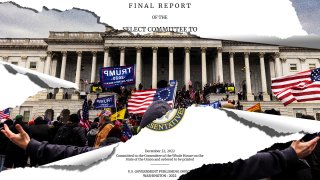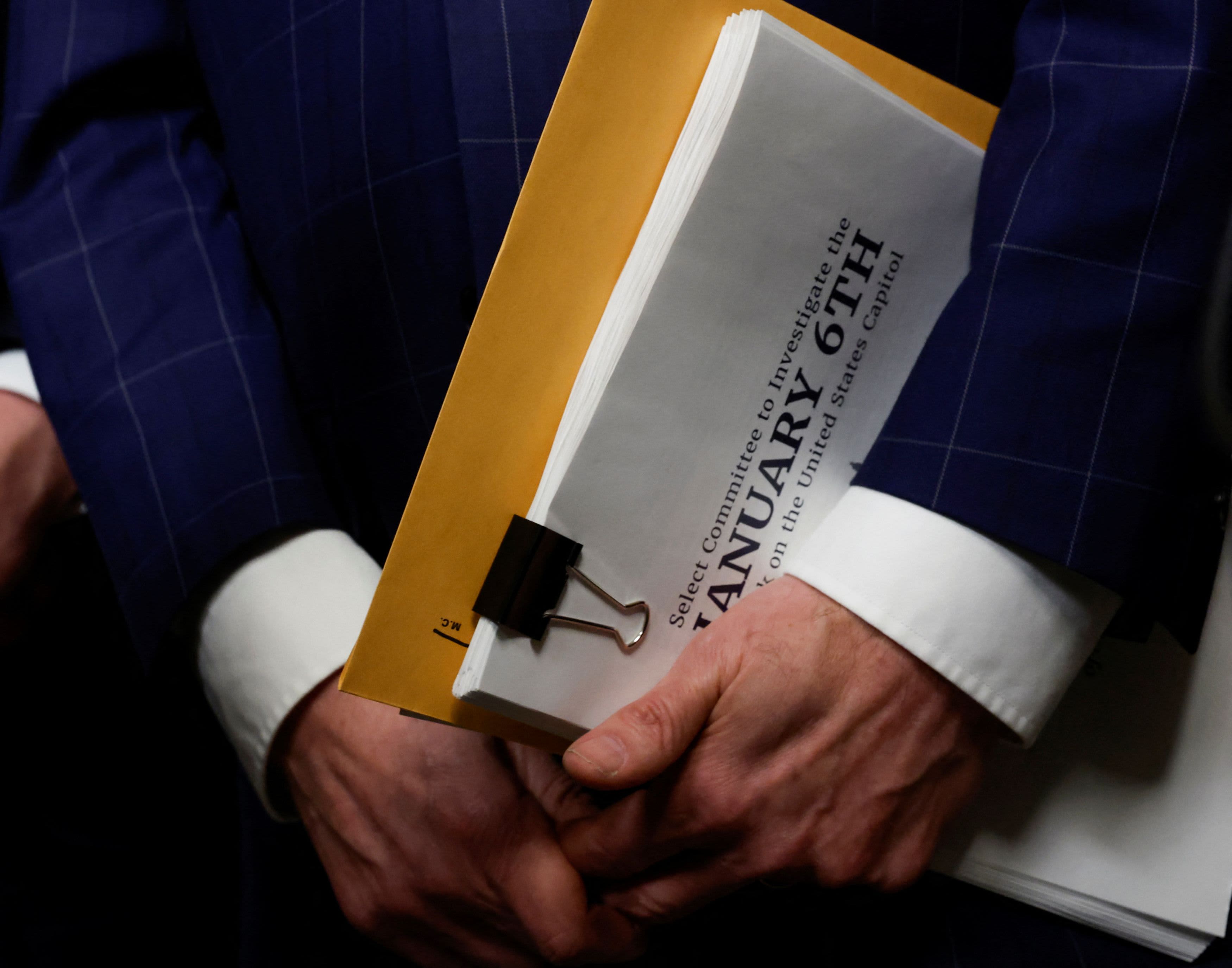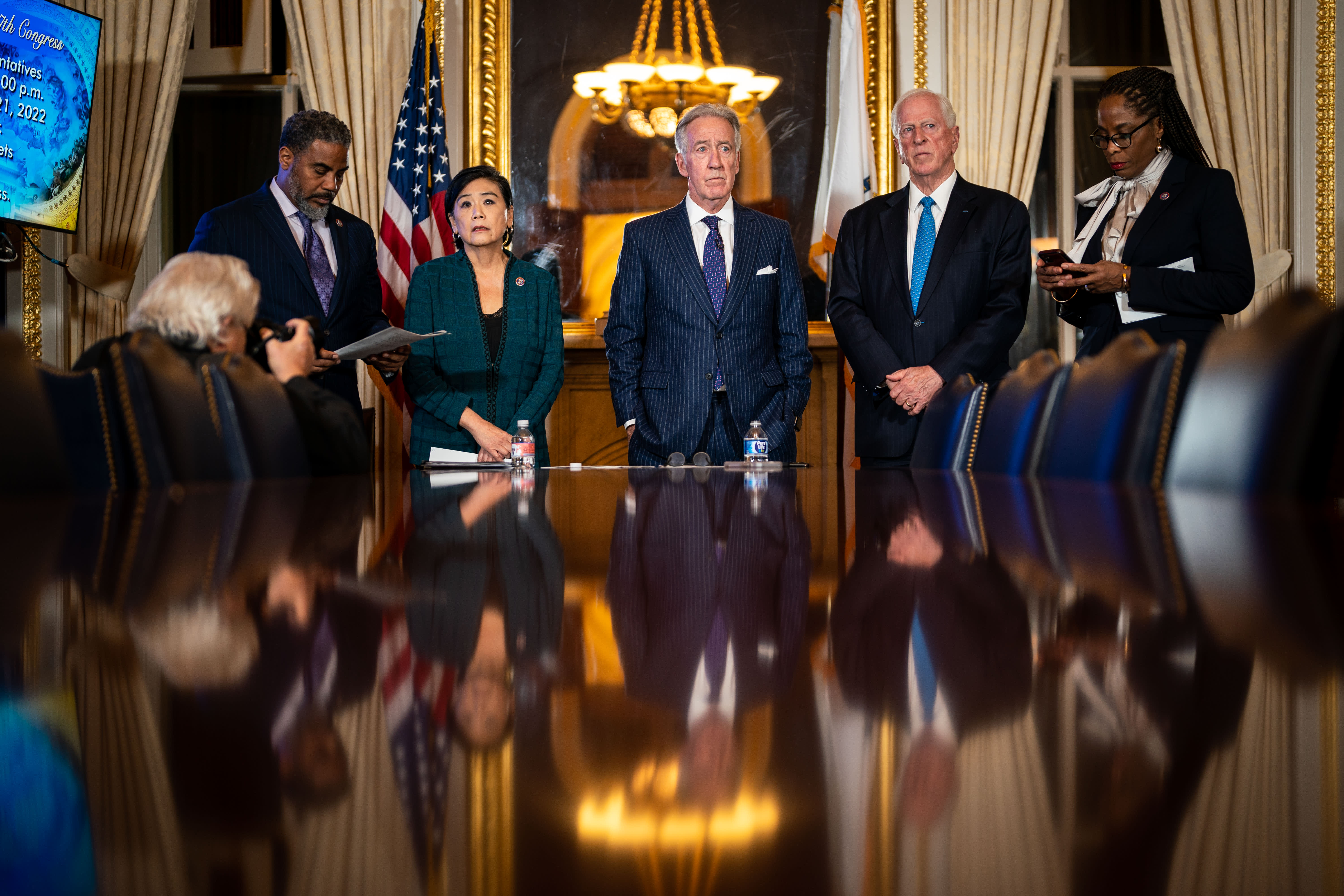
Former President Donald Trump promised a “big protest” in Washington, D.C. on Jan. 6 two years ago, tweeting “Be there, will be wild!” and it was.
A mob with Trump hats and flags overtook the U.S. Capitol, rampaging through the hallways and sending lawmakers into hiding for their safety. Five people died during the riot and others afterward, including U.S. Capitol Police Officer Brian Sicknick.
On the anniversary of the failed attempt to overthrown the results of the presidential election, its shadow still looms large over national politics and the judicial system.
Here are some key developments:
Get Tri-state area news delivered to your inbox.> Sign up for NBC New York's News Headlines newsletter.
A Chaotic Republican Party, But Democracy Holding Firm
The Capitol has been wild again in recent days, albeit in a procedural fight. Republicans are in disarray as they try to choose a House speaker with California Rep. Kevin McCarthy losing repeated votes even with support from Trump.
A group of conservative lawmakers that includes former Trump loyalists Rep. Matt Gaetz of Florida and Rep. Lauren Boebert of Colorado has blocked his way.
"They basically are just thumbing their nose at him," said Kevin Kosar, a senior fellow at the American Enterprise Institute. "And these are people who were all out warriors for him during the impeachment process and everything."
When insurrectionists stormed the Capitol and Rep. Nancy Pelosi and others urged defense officials to send out National Guard troops, many Americans worried whether democracy would survive. Would the rioters escape punishment? Should the country be afraid of another attack on Washington? What were the chances that Trump supporters would win state positions that would put them in control of election results? Would some future vice president agree with the discredited notion that he or she could refuse to certify results?
But despite fears, particularly among the left, that representative democracy would collapse into Hitlerite autocracy it did not happen, Kosar said. “We didn’t see waves of populist violence around the November elections as people were predicting in some instances and so I think that the lowering of the temperature and anxiety level about the health of the Republic and the future of democracy is a good thing.”
Among the changes of the last two years was an update of the 1887 Electoral Count Act by a bipartisan group of lawmakers that clarifies that the role of the vice president is ceremonial and raises the threshold of challenging the Electoral College results to 20% of each chamber. Trump tried to use the act to convince then Vice President Pence that he could reject electoral votes from some states and block or delay certification of Joe Biden's presidential victory.
"The country certainly isn’t out of the woods," said Linda Fowler, a research professor in government at Dartmouth College. "The people who were rioting, and the people who were encouraging them and people hoping to profit by all the lying are still out there. But the guardrails sort of held, enough for the country to begin to calm down. I guess a lot of the country has calmed down and where they haven’t calmed down is in the Republican party on Capitol Hill."
Donald Trump's Diminished Influence
Trump’s waning influence has been on display in recent months. He announced another run for president for 2024 to little enthusiasm among some former supporters. He has been blamed for the GOP losses in the midterm election, particularly in the Senate, and as Republicans took control of the House this week, it remained in chaos.
"Some really good conversations took place last night, and it's now time for all of our GREAT Republican House members to VOTE FOR KEVIN, CLOSE THE DEAL, TAkE THE VICTORY," Trump wrote in a post on the Truth Social media platform to no avail. "REPUBLICANS, DO NOT TURN A GREAT TRIUMPH INTO A GIANT & EMBARRASSING DEFEAT."
Far from rallying the Republicans, his posts prompted Boebert to call on McCarthy to withdraw. In November, a “red wave” failed to sweep Washington, D.C., and although Republicans won the House they lead with a much smaller margin than expected.
Trump’s false claim that the presidential election had been stolen — a line of attack adopted by some other Republicans in their own races, Kari Lake, the losing candidate for Arizona governor for example — has lost credence among the public, particularly among the political right, Kosar said.
“Not least because you’ve had dozens of dozens of court cases brought by Trump and other people, Kari Lake etc. and in a court of a law they just can’t substantiate what they’re claiming,” he said. “And you can only tell the public something so many times without backing it up before some of the them just back away. And sure there’s going to be a hardcore bunch of people out there who are claim this to their graves but they’re a minority.”
A Historic Investigation
The House Jan. 6 committee investigating the attack on the Capitol surprised many with dramatic hearings that drew on a format of live testimony and video-taped interviews.
The country heard from a former White House aide, Cassidy Hutchinson, who testified that Trump flung plates and ketchup at the wall in the White House and lunged at the driver of his SUV in his desire to get to the Capitol with the mob.
From transcripts of interviews, the public learned that presidential advisor Hope Hicks told an aide to Ivanka Trump during the Capitol riot, “In one day he ended every future opportunity that doesn’t include speaking engagements at the local Proud Boys chapter,” she wrote. “All of us that didn’t have jobs lined up will be perpetually unemployed.”
Ginni Thomas, the wife of U.S. Supreme Court Justice Clarence Thomas, told the committee that she regretted texts urging the overturning the presidential election that included this claim from right-wing websites: “Biden crime family & ballot fraud co-conspirators (elected officials, bureaucrats, social media censorship mongers, fake stream media reporters, etc) are being arrested & detained for ballot fraud right now & over coming days, & will be living in barges off GITMO to face military tribunals for sedition.”
Through its last days in session, the committee released more than 250 transcripts of interviews. In its final report it blamed the riot squarely on Trump as part of a “multi-part plan to overturn the 2020 Presidential election.” It made four criminal referrals to the Department of Justice for Trump, among them obstruction, conspiracy and inciting an insurrection.
The investigative committee created a historical record that will be useful in deciding whether prosecutions take place and as a reference point when people make claims that are not borne out by the facts, Fowler said.
"So getting that record out, getting the documents out, getting the testimony out, putting it together in a coherent way," she said. "I think the committee did an outstanding job and ended up being more consequential than I thought it might be. So we have a clear narrative about what actually happened and most importantly what let up to it."
Republicans have vowed to investigate the committee itself now that they have control of the House, a move likely to try to discredit its findings. In a November letter, McCarthy warned the committee to preserve its records, something it was already required to do, and said he would investigate the security breakdowns that allowed the rioters to enter the Capitol.
“Although your committee’s public hearings did not focus on why the Capitol complex was not secure on Jan. 6, 2021, the Republican majority in the 118th Congress will hold hearings that do so,” McCarthy wrote in the letter to Rep. Bennie Thompson, the Mississippi Democrat who chaired the Jan. 6 committee.
A special counsel, Jack Smith, who was appointed by Attorney General Merrick Garland, is investigating criminal accusations against Trump. Smith is heading an investigation into the Jan. 6 attack and Trump’s possible mishandling of classified documents at Mar-a-Lago, his home and club in Florida.
Hundreds of Court Cases and Lives Changed
Meanwhile the rioters themselves are being brought to account in the courts.
More than 950 people have been arrested, according to the Department of Justice. Two hundred and eighty-four have been charged with assaulting, resisting, or impeding officers or employees, including about 99 who have been charged with using a deadly or dangerous weapon or causing serious bodily injury to an officer. About 140 police officers were assaulted on Jan. 6.
Fowler said she thought some of the higher level advisers, John Eastman for example, could eventually be prosecuted. Eastman, the lawyer who wrote the plan for keeping Trump in office, was referred to the Justice Department by the Jan. 6 committee for possible prosecution on criminal charges.
"There will be a reckoning," she said.
The FBI continues to look for rioters. Days before the anniversary it asked for public tips to locate Evan Neumann and Jonathan Daniel Pollack, both wanted on charges of assault and other crimes.
Referring to the law enforcement officers who defended members of Congress and to the five who have since died, Garland said in a statement: “The Justice Department remains committed to honoring them.
"We remain committed to ensuring accountability for those criminally responsible for the January 6 assault on our democracy," he said. "And we remain committed to doing everything in our power to prevent this from ever happening again.”





